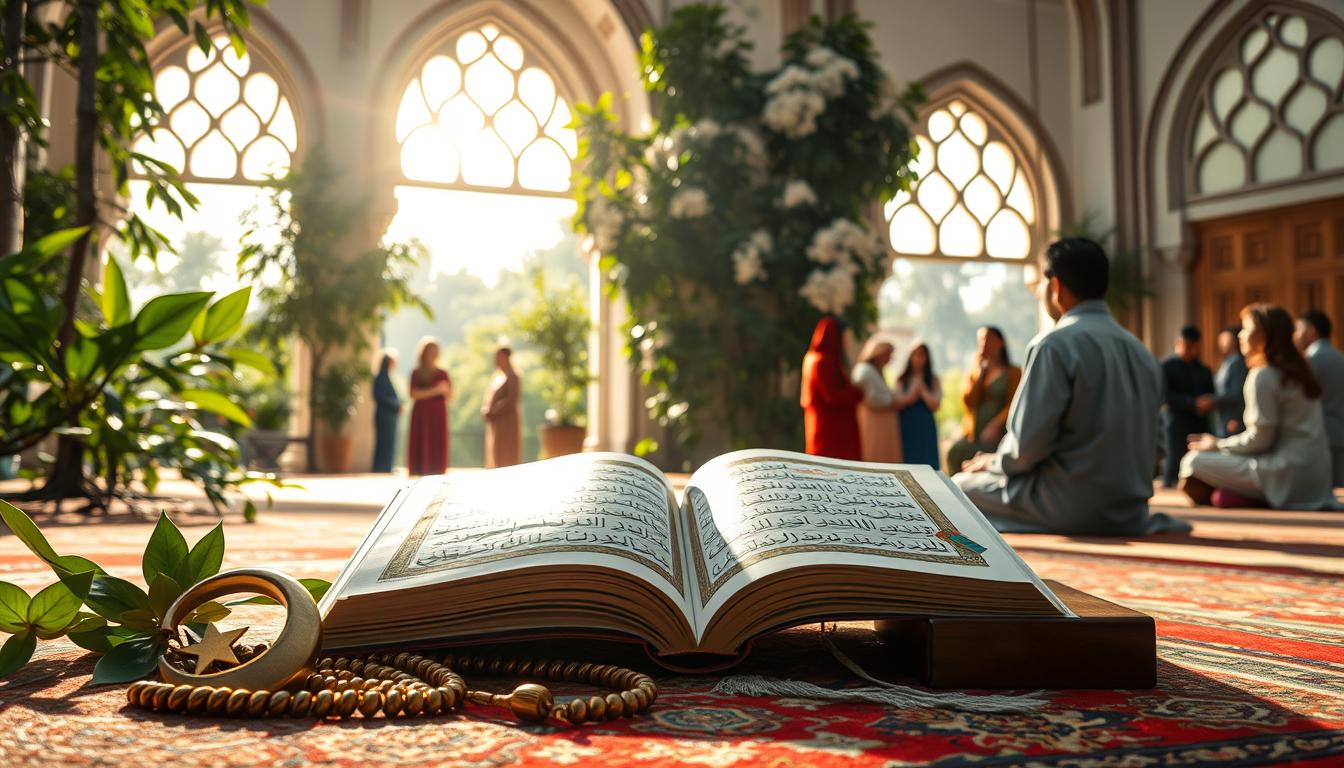We welcome you to our community and invite you to learn about Islam. This journey is exciting and full of discovery. Islam is a beautiful way of life that guides every aspect of a Muslim’s life.
As a new Muslim, it’s key to grasp the basics. This includes the five daily prayers, the Islamic calendar, and the value of learning prayers.
At Umar Khan Charity Organization, we’ve helped new Muslims for over 20 years. We aim to give everyone the right info about Islam. We’re here to support you in growing your faith.
Whether you want to learn more about Islam or apply its principles in your life, we’re here. We’re ready to help.
Key Takeaways
- Islam is a way of life that encompasses all aspects of a person’s life
- Understanding the basics of Islam is essential for every new Muslim
- The five daily compulsory prayers are an important part of Islamic practice
- The Islamic calendar is based on lunar months and plays a significant role in Islamic life
- Learning prayers is emphasized over other aspects of Islam
- Umar Khan Charity Organization is here to provide resources and support for new Muslims
- Contact us at +256742603101, [email protected], or visit www.umarkhancharity.org for more information
We hope this info has been helpful in introducing you to Islam. We’re excited to support you on your journey. We’re here to provide the knowledge you need to grow in your faith.
Understanding the Foundation of Islamic Faith
Understanding the Islamic faith is key for new Muslims. It’s based on believing in one God, Allah. It’s a way of life that touches every part of a person’s life.
At its heart, Islamic faith is about living with purpose, kindness, and helping others. It’s guided by justice, equality, and mercy.
The Islamic faith’s foundation is built on important values and principles. These include believing in Allah’s Oneness, the importance of prayer, charity, and pilgrimage. These values and principles are the heart of the Islamic faith.
They help guide a virtuous and meaningful life. We hope new Muslims will deepen their faith and live by Islam’s teachings.
Some key Islamic values and principles are:
- Belief in the Oneness of Allah
- Importance of prayer and worship
- Charity and giving to those in need
- Pilgrimage to Mecca at least once in a lifetime
We believe living by these values and principles builds a strong faith. It leads to a life pleasing to Allah. We hope this helps you understand the Islamic faith’s foundation. Support our cause by volunteering, sharing our mission, or donating online.
The Five Pillars of Islam
We encourage you to learn about the Five Pillars of Islam. These are the basics of a Muslim’s practice. We will explore the declaration of faith, prayer, charity, fasting, and pilgrimage.
The Five Pillars of Islam are key practices for all Muslims. They include the Muslim creed, prayer, charity, fasting in Ramadan, and the pilgrimage to Mecca. These pillars are crucial for a strong faith.
Here are the Five Pillars of Islam:
- Shahada: The declaration of faith, which involves reciting “There is no God but God and Muhammad is the Messenger of God.”
- Salah: The second pillar, which involves specific prayers performed five times a day facing Mecca, with particular positions and recitations required.
- Zakat: The third pillar, which involves almsgiving or charity to purify one’s wealth and assist those in need.
- Sawm: Fasting during the holy month of Ramadan, which involves abstaining from eating, drinking, and other pleasures from dawn to sunset.
- Hajj: The pilgrimage to Makkah, which is a once-in-a-lifetime duty for Muslims who are physically and financially able.
By following the Five Pillars of Islam, Muslims can strengthen their faith and connect with their community. We invite you to join us on this journey of discovery and growth. Let’s learn more about the Five Pillars of Islam together.
The Six Articles of Faith in Islam
Understanding the Six Articles of Faith is key for every Muslim. They form the base of our faith. These include believing in Allah, angels, divine books, prophets, the Day of Judgment, and divine decree. We aim to live by these principles.
The Six Articles of Faith can be summarized as follows:
- Belief in Allah, the one and only God
- Belief in angels, who serve as messengers of Allah
- Belief in divine books, including the Quran and other scriptures
- Belief in prophets, who convey Allah’s message to humanity
- Belief in the Day of Judgment, where individuals will be judged based on their deeds
- Belief in divine decree, which emphasizes Allah’s plan for the universe
Our faith in Islam is based on these Six Articles. They are crucial for a deep connection with Allah. We hope this info helps you understand the Six Articles of Faith in Islam. We aim to positively impact those around us.
Living by the Six Articles of Faith can lead to a better future. Our faith in Islam gives us strength and inspiration. We’re committed to sharing this with others.
| Article of Faith | Description |
|---|---|
| Belief in Allah | The belief in one God, who is the creator and sustainer of the universe |
| Belief in Angels | The belief in angels, who serve as messengers of Allah |
| Belief in Divine Books | The belief in divine books, including the Quran and other scriptures |
| Belief in Prophets | The belief in prophets, who convey Allah’s message to humanity |
| Belief in the Day of Judgment | The belief in the Day of Judgment, where individuals will be judged based on their deeds |
| Belief in Divine Decree | The belief in divine decree, which emphasizes Allah’s plan for the universe |
The Holy Quran: Understanding Allah’s Words
We invite you to learn about the Holy Quran, which is the word of Allah. It is the holy book of Islam, given to the Prophet Muhammad. It guides Muslims worldwide. With over 1 billion followers, its importance in Islam is clear.
The Quran talks about roles in society, like leaders and parents. It stresses the need to read, think, and live by its teachings. Allah says in the Quran: “Then do they not reflect upon the Quran or are there locks upon their hearts?” (Surah Mohammad verse 24). We can understand the Quran by reading it in a language we know well. Reflecting on each verse’s meaning is also important.
Here are some key aspects of the Quran:
* The Quran should be read in a language the reader understands fluently for better comprehension.
* The Quran addresses various roles in society, such as leaders, parents, children, citizens, and more.
* There are mainly five rights of the Qur’an upon the reader.
* The importance of recitation is highlighted by Allah in the Holy Qur’an, stating: “Recite the Qur’an with measured recitation.” (Surah Al Muzammil verse 4).
By understanding and applying the Quran’s teachings, we can live a successful life. We can also receive Allah’s mercy. The Prophet Muhammad ﷺ showed us Allah’s mercy is like a mother’s care. We encourage you to support our cause by donating online, via mobile money, or in-kind. Join us in our mission to change lives through faith-based humanitarian work.
Prayer in Islam (Salah)
Prayer, or Salah, is key in Islam. It’s a way to talk to Allah and is one of the Five Pillars of Islam. Learning about prayer in Islam is vital for every Muslim.
Prayer in Islam is more than a ritual. It’s a way of life. It helps Muslims connect with Allah, seek guidance, and find peace. The five daily prayers include Fardh, Wajib, Sunnah, and Nafl. Each prayer has its own importance and rules.
Preparation for Prayer
To prepare for prayer, one must have the right intention and be mature and sane. The clothes for Salah should cover private parts, and prayer should face the Qibla (Mecca). We must also be physically and spiritually pure.
Prayer Times and Requirements
The five daily prayers have specific times and rules. The Surah Al-Fatiha is recited in each rakat of Salah. Different Quran passages can be recited after Al-Fatiha in the first two rakats.
Tasbeeh is recited in Ruku and Sujood positions of Salah. The Tashahhud is recited silently during the final sitting position of Salah. Following these guidelines makes our prayer valid and accepted by Allah. Prayer is for seeking guidance, forgiveness, and mercy from Allah. We must be sincere, humble, and mindful of our actions and intentions.
Basics of Islam: A Practical Guide to Daily Life
Understanding Islam’s basics is key to a righteous life. We should apply Islamic principles in our daily routines. This includes how we eat, drink, and interact with others.
Key Islamic principles for daily life include:
- Being mindful of our thoughts and actions, and striving to do good deeds
- Treating others with kindness and respect, regardless of their background or beliefs
- Being honest and truthful in all our interactions
- Taking care of our physical and mental health, and seeking help when needed
By living these principles, we can build a more harmonious community. The Quran says, “And indeed, you are of a noble character” (Quran 68:4). We hope this guide helps you understand and apply Islam in your life.
Islam is a complete way of life. It guides us on how to live righteously. By following Islam, we can work towards a more just and peaceful world.
| Aspect of Life | Islamic Guidance |
|---|---|
| Eating and Drinking | Avoiding prohibited foods and drinks, such as pork and alcohol |
| Social Interactions | Treating others with kindness and respect, regardless of their background or beliefs |
| Physical and Mental Health | Taking care of our physical and mental health, and seeking help when needed |
Islamic Ethics and Moral Values
We think Islamic ethics and moral values are key for a strong character. They help society too. These values come from the Quran and Hadith, guiding us to live right.
Important virtues in Islam include kindness, charity, and forgiveness. Also, honesty, patience, and justice are crucial. We must respect our elders and keep our promises. Controlling anger is also vital.
These virtues are universal and strengthen both individuals and society. The practice of these virtues is called Akhlaq. It includes decency, morals, and ethics, essential for a Muslim’s life.
Learning about Islamic ethics and moral values is important. We invite you to support our cause by volunteering your time and skills.
Here are some key principles of Islamic ethics and moral values:
- Respect for family and community
- Importance of honesty and integrity
- Value of charity and generosity
- Need for patience and self-control
- Importance of justice and fairness
Halal and Haram: Understanding Islamic Lifestyle
Understanding Halal and Haram is key for every Muslim. Halal means what is allowed, while Haram means what is forbidden. We aim to follow Halal in our daily lives, like eating fruits, veggies, grains, and Halal meat, as the Quran (2:172) teaches.
We must avoid dishonest money practices, like usury, gambling, and fraud, which are Haram. We also follow rules on clothes, like men not wearing gold or silk. These rules come from the Quran and Hadith, guiding us every day.
Examples of Halal and Haram practices include:
- Eating Halal food, like meat slaughtered the right way
- Staying away from Haram activities, like gambling and usury
- Following rules on clothes
- Doing acts of worship, like praying, fasting, giving to charity, and going on Hajj
We hope this helps you understand Halal and Haram in Islam. Our aim is to explain these important principles clearly. We want to inspire our readers to live a more genuine and meaningful Islamic life.
| Halal Practices | Haram Practices |
|---|---|
| Consuming permissible foods | Dishonest financial practices, such as usury/interest |
| Respecting prohibitions on certain clothing choices | Engaging in activities such as gambling and fraud |
| Engaging in acts of worship, such as prayers and fasting | Consuming Haram food, such as pork |
The Role of the Mosque in Islamic Life
The mosque is key in Islamic life. It’s a place for community worship, learning, and social events. Here, Muslims gather to pray, study, and bond, creating a sense of unity.
The mosque is more than a worship space. It’s a center for education and social activities. Muslims visit often to pray and participate in study groups and community service. It’s a place to show Islam’s peaceful side, helping to clear up misunderstandings.
Some of the mosque’s main roles include:
- Community worship: It’s where Muslims come together for daily prayers and other acts of worship.
- Islamic education: The mosque is a hub for learning about Islam and its teachings.
- Social functions: It’s a space for socializing and community service.
The mosque is a source of spiritual growth. It helps Muslims deepen their faith and connect with others. We encourage you to explore the mosque’s role in Islamic life and its importance in worship, education, and social activities.
Islamic Calendar and Major Celebrations
We hope this info helps you understand the Islamic calendar and its big celebrations. Your support is very important to us. The Islamic calendar, also known as the Hijri calendar, follows the moon. It’s about 11 days shorter than the Gregorian calendar each year.
The Islamic calendar is packed with important celebrations that Muslims worldwide observe. Some key celebrations include:
- Ramadan, the 9th month, where Muslims fast from dawn to sunset.
- Eid ul-Fitr, which ends Ramadan. It’s filled with special prayers, sweets, and community fun.
- Hajj, a yearly trip to Mecca, made by millions of Muslims.
- Eid ul-Adha, after Hajj. It involves sacrificing an animal, sharing the meat, and celebrating together.
These celebrations are a big part of the Islamic calendar. Muslims celebrate them with joy and dedication. We aim to share knowledge about the Islamic calendar and its celebrations. We hope you’ll join us in this learning journey.
Learning about the Islamic calendar and its celebrations helps us unite. It promotes understanding of Islamic values and principles.
| Celebration | Date | Significance |
|---|---|---|
| Ramadan | March 23, 2023 | Month of fasting and spiritual reflection |
| Eid ul-Fitr | April 21, 2023 | End of Ramadan and celebration of fasting |
| Hajj | June 28, 2023 | Annual pilgrimage to Mecca |
| Eid ul-Adha | June 29, 2023 | Celebration of sacrifice and communal sharing |
Building a Strong Muslim Identity
We know how vital it is to build a strong Muslim identity. It’s key to keeping our faith strong in today’s world. We must hold onto our Islamic values and principles, no matter what.
Our faith gives us strength and direction. By embracing it, we find purpose and direction. In today’s world, it’s easy to lose sight of our spiritual roots. But by focusing on our Muslim identity, we stay true to what’s important.
Building a strong Muslim identity involves several key steps. We must embrace Islamic values and principles. We also need to build a sense of community and stay informed about Islamic teachings.
Engaging in acts of worship and service to others is crucial. By doing these things, we build a strong and resilient Muslim identity. This identity will help us in every part of our lives.
As we work to build our Muslim identity, we face many challenges. There are external pressures and internal doubts and fears. But by staying true to our values and supporting each other, we can overcome these obstacles. We will come out stronger and more resilient than ever.
Common Challenges for New Muslims
Embracing a new faith can change your life, but it also brings challenges. As new Muslims, you might struggle to grasp and apply Islamic teachings. You may find it hard to share your faith with family and friends, learn the prayer, or adjust your lifestyle.
These challenges can feel overwhelming. But, with the right help and support, new Muslims can overcome them. We aim to share our experiences and knowledge to make their journey smoother and more fulfilling.
Some major challenges for new Muslims include:
- Learning the prayer and its importance
- Changing your diet, social habits, and how you dress
- Finding a supportive community and making new friends
- Understanding your rights and duties in marriage and life

We think by recognizing and tackling these challenges, we can build a more welcoming space for new Muslims. Our aim is to offer useful resources and advice to aid their journey and faith growth.
Resources and Support for Your Islamic Journey
Starting an Islamic journey can change your life. It’s important to have the right resources and support for growth. Having reliable sources of information is key as you explore your faith.
Many resources are available to help on your Islamic journey. These include Islamic literature, online learning platforms, and community support groups. They offer guidance, answer questions, and provide a sense of community.
Some examples of resources include:
- Islamic books and articles that provide insight into Islamic teachings and practices
- Online courses and lectures that offer in-depth knowledge of Islamic studies
- Community support groups that provide a safe and supportive environment to connect with others who share similar interests and values
Using these resources can deepen your understanding of Islam. It helps you connect with others who share your faith. And it makes navigating challenges on your journey easier.
Your Islamic journey is unique, and the right resources and support can make a big difference. We invite you to explore these resources and connect with us on social media. Learn more about our mission and how we can support you on your journey.
| Resource | Description |
|---|---|
| Islamic Literature | Books and articles that provide insight into Islamic teachings and practices |
| Online Learning Platforms | Online courses and lectures that offer in-depth knowledge of Islamic studies |
| Community Support Groups | Support groups that provide a safe and supportive environment to connect with others who share similar interests and values |
Conclusion: Embracing Your Path in Islam
Starting your journey in Islam may not be simple, but it’s rewarding. The Quran says, “Indeed, Allah will not change the condition of a people until they change what is in themselves” (Quran, 13:11). Your hard work and commitment to Islam will lead you to a life of purpose and peace.
The Prophet Muhammad (peace be upon him) taught, “Seeking knowledge is obligatory upon every Muslim.” Keep exploring Islamic teachings. Let your faith light your way. The Quran also says, “And those who strive for Us – We will surely guide them to Our ways. And indeed, Allah is with the doers of good” (Quran, 29:69).
Challenges will come, but the Muslim community is here to help. Look for resources, go to mosque events, and meet other Muslims. Your journey in Islam is about more than just rituals. It’s about deepening your connection with Allah and finding your life’s purpose.
Start this new chapter with an open heart and a desire to learn. May your path in Islam be filled with growth, fulfillment, and strong faith. We’re here to support you, and we believe your dedication to Islam will bring you joy and blessings.






